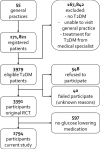Insulin Therapy in Type 2 Diabetes Is Associated With Barriers to Activity and Worse Health Status: A Cross-Sectional Study in Primary Care
- PMID: 33776906
- PMCID: PMC7989698
- DOI: 10.3389/fendo.2021.573235
Insulin Therapy in Type 2 Diabetes Is Associated With Barriers to Activity and Worse Health Status: A Cross-Sectional Study in Primary Care
Abstract
Introduction: Many individuals with type 2 diabetes mellitus (T2DM) experience "psychological insulin resistance". Consequently, it could be expected that insulin therapy may have negative effects on psychological outcomes and well-being. Therefore, this study compared health status and psychosocial functioning of individuals with T2DM using only oral antihyperglycemic agents (OHA) and on insulin therapy (with or without OHA).
Materials and methods: In this cross-sectional study, we used baseline data of a cluster randomized controlled trial conducted in 55 Dutch general practices in 2005. Health status was measured with the Short Form (SF)-36 (scale 0-100) and psychosocial functioning with the Diabetes Health Profile (DHP, scale 0-100). To handle missing data, we performed multiple imputation. We used linear mixed models with random intercepts per general practice to correct for clustering at practice level and to control for confounding.
Results: In total, 2,794 participants were included in the analysis, their mean age was 65.8 years and 50.8% were women. Insulin-users (n = 212) had a longer duration of T2DM (11.0 versus 5.6 years) and more complications. After correcting for confounders and multiple comparisons, insulin-users reported significantly worse outcomes on vitality (SF-36, adjusted difference -5.7, p=0.033), general health (SF-36, adjusted difference -4.8, p=0.043), barriers to activity (DHP, adjusted difference -7.2, p<0.001), and psychological distress (DHP, adjusted difference -3.7, p=0.004), all on a 0-100 scale.
Discussion: While previous studies showed similar or better health status in people with type 2 diabetes receiving insulin therapy, we found that vitality, general health and barriers to activity were worse in those on insulin therapy. Although the causality of this association cannot be established, our findings add to the discussion on the effects of insulin treatment on patient-reported outcomes in daily practice.
Keywords: health status; insulin; oral antihyperglycemic agents; psychosocial functioning; type 2 diabetes.
Copyright © 2021 Boels, Rutten, Cleveringa, van Avendonk and Vos.
Conflict of interest statement
AMB reports an unrestricted grant from Sanofi-Aventis for a study in type 2 diabetes patients on insulin therapy (support of self-management by mHealth), outside the submitted work. GR received an unrestricted research grant from Sanofi Aventis and fees from Novo Nordisk for consultancy and lecturing, outside the submitted work. FC received a fee from Novo Nordisk for a lecture (2016), not related to the submitted work. MA reports an unrestricted grant from Sanofi Aventis for conducting studies (till 2010) regarding insulin therapy in type 2 diabetes patients. RV reports an unrestricted grant from Sanofi-Aventis for a study in type 2 diabetes patients on insulin therapy (support of self-management by mHealth) outside the submitted work.
Figures
References
Publication types
MeSH terms
Substances
LinkOut - more resources
Full Text Sources
Other Literature Sources
Medical


